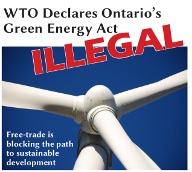As expected, people aren’t very happy with the WTO decision this week reaffirming the illegality (under global trade rules) of local content requirements in the Ontario Green Energy Act. The WTO Appellate Body, which has a final say in trade disputes between countries, agreed with a WTO panel report on December 19 that the high local content quotas on solar and wind components (up to 60 per cent) discriminate against products manufactured elsewhere. Japan and the European Union were the complainants in the WTO case, which has attracted global attention for the threat this final decision will create for similar local content rules on energy, transit and other types of government spending around the world.
In the United States, government and corporate watchdog group Public Citizen issued a joint release with the Sierra Club saying the Ontario case “underscores the threat the WTO poses to a clean energy future.” Director of Public Citizen’s Global Trade Watch Lori Wallach compared Canada’s loss to a string of WTO cases against the United States in the past few years related to public health and environmental measures.
“By ordering the rollback of a successful program that is reducing carbon pollution and creating green jobs after recently sacking three popular U.S. consumer protection policies, the WTO is destroying whatever shred of legitimacy it still had after years of imposing its anti-consumer, anti-environment dictates,” Wallach said in the release. “Just like the WTO rulings ordering the U.S. to gut popular laws on country-of-origin meat labels, dolphin-safe tuna labels and limits on candy-flavored cigarettes marketed to kids, this latest attack against an initiative promoting renewable energy, localization and green job creation is simply unacceptable.”
(Canada was the source of the WTO dispute to the US meat labelling policy. And just today in Brussels, Natural Resources Minister Joe Oliver was again threatening to challenge a European clean energy policy — the Fuel Quality Directive — at the WTO if it lists Alberta tar sands crude oil as more carbon-intensive than other fuels, which of course it is.)
Ilana Solomon of the Sierra Club highlighted the importance of creative public policy responses to climate change so that greenhouse gas emissions can be lowered quickly.
“As people around the world grapple with consequences of the climate crisis, their governments should and must use every tool available to reduce dangerous carbon pollution and create new clean energy jobs,” she said. “To avoid climate chaos, the WTO needs to get out of the way of innovative and successful climate solutions and job creators.”
Here in Canada, the United Steelworkers and the Communications, Energy and Paperworkers Union of Canada also made statements about the WTO decision.
“Ontario should not give up the struggle for good green jobs,” said Ken Neumann, USW National Director for Canada. “We should not be allowing unelected bodies to wipe out initiatives that are good for our climate and good for our economy at the same time.”
Dave Coles, national president of the CEP, said Ontario’s energy policy “was meant to gear the local economy towards production that would simultaneously create jobs and reduce greenhouse gas emissions: exactly the kind of program that is needed to combat climate disturbances and high unemployment rates.”
Coles added that, “Losing this appeal is another example of a trade deal hindering our governments’ ability to do what’s right and a reminder that they should be abandoned.”
The USW director admitted the Green Energy Act “is not perfect,” but it has created an estimated 31,000 jobs in the province, generating billions of dollars in investment, and allowed Ontario to phase out its last coal-fired power plants. Neumann said he’s concerned about how this ruling opens the door to Japan and the EU slapping punitive tariffs or other trade barriers on Canadian exports to those countries, and like Wallach he suggests it’s time for the WTO — not “buy local” policies — to change.
“This should not be the end of the fight,” he said. “The WTO ruling clearly shows the need to change the direction of trade negotiations to support jobs and the environment. Our federal and provincial governments must act.”
The Ontario government has so far only said it will not abandon the Green Energy Act in response to media questions about the WTO decision. As reported by CBC, the federal government, which is ultimately responsible for WTO decisions involving Canada, said, “As this is the first time Canada has received a WTO panel ruling arising solely from provincial policy or legislation, we will work with the Ontario government in order to respond to the decision.”
It could still be months or years before we see that response. The WTO requires countries to bring the offending policy in line with its decision, which could mean taking away the local content component. But as we said in a press release on Monday, taking away the job creation aspect of a jobs and climate policy renders it very unattractive for Ontarians. We hope and will insist it isn’t an option.
The Council of Canadians will be working with Ontario labour, environmental and student groups in the coming weeks and months to better understand the WTO ruling and to propose solutions to the Ontario government for how to maintain and improve the Green Energy Act. To read our March 2013 joint briefing note on the WTO decision with those groups, click here.




